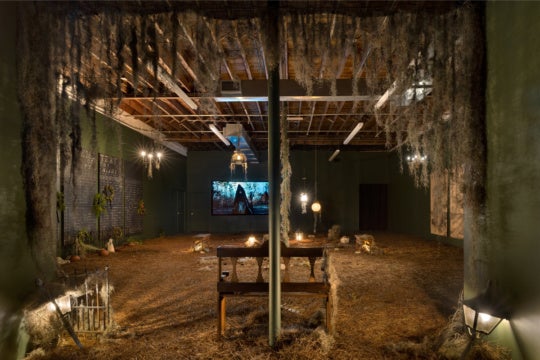Click above for the trailer of The Room, or click here to watch it at YouTube. Or watch it in Atlanta with a live, in-person appearance by Tommy Wiseau at the Plaza Theatre this Friday-Sunday, May 11-13, 2012.
By now a great number of readers might already know about the cult phenomenon of Tommy Wiseau’s quixotic attempt at movie making, 2003’s The Room. It has been made into a video game; model and actor Greg Sistero is writing a book about his experience acting in the film; and it thrives to this day in theaters across the country, often accompanied by its creator, who has played along with its viral success by claiming to have intentionally crafted his film as a “black comedy.” No one believes him, but that doesn’t prevent throngs of eager attendees from forking over a slice of their income to see and re-see The Room in actual for-real theaters.
The experience the film offers is a unique one, as it has garnered a following akin to cultural heavyweights such as The Rocky Horror Picture Show and The Big Lebowski. Unlike those films, however, The Room is in no way a competent work of craftsmanship, and indeed excels at being quite the opposite.
The film’s focus is the relationship between Johnny (Tommy Wiseau) and Lisa (Juliette Danielle). Johnny is set up as a noble, loving character, and Lisa is a fickle femme fatale, who personally creates the plot’s main turbulence with her shallow equivocations.
The whole formulation feels like Wiseau has a chauvanist’s grudge toward women, which is only palatable to the audience because of the characters’ disingenuous delivery. One of the film’s best moments is when Johnny, upon confronting Lisa about her spurious claims of abuse, cries, “You are tearing me apart, Lisa!” It is at this point when the farce reveals itself completely, allowing everyone present in the theater to guffaw in unison and release the angst of so many affronts to their movie-watching acumen.
At a glance, the film appears to conform to a broad, recently formed pattern of moving-image consumption that feeds upon the experience of schadenfreude. The public’s neurosis to this end is most evident in reality TV and YouTube, where passive voyeuristic audiences addict themselves to observing how awful other people are. But, significantly, you can’t digest the whole film in this way.
While it’s true that the most apparent feature of The Room is its creator’s cavalier ineptitude, there’s a good deal more to the film’s experience than a revelry of mass hatred at a bad movie. Why, then, would audiences leave their homes and pay money when they can despise so many things from the comfort of their own homes?
There is a sort of depth to The Room: riddled with mysteriously insane little moments that are so odd and alien, they become captivating. The film follows a narrative skeleton that Wiseau must have gleaned with his dilettante’s eye for cinema. It contains all the basic abstract elements of a successful commercial film, such as gratuitous sex scenes, deteriorating relationships, and a climactic ending. However, these dots are connected by a train wreck of dialog and scene-building that persistently confounds the viewer with its failures and strangeness.
Here, all attempts at maintaining the cinematic illusion are grossly self-defeating. The following are just a few examples: The story frequently creates poor excuses for characters to speak to each other, such as the motif of actors talking as they play sad games of catch in confined spaces. Characters’ emotions wax and wane as if they had severe cases of manic-depressive disorder. Simple interchanges such as the buying of flowers become surreal moments: basic pleasantries rendered as if the writer has never had a casual conversation in his life. Moments of high drama occur in a vacuum deprived of emotional foundation. And the exact same sex scene recurs as if the audience were expected to be horny amnesiacs.
Intuitively, Wiseau has included in his film all the tropes viewers expect to see in any popcorn-munching flick, but placed in an environment that exposes them to the hot tropical sun of naked ridicule. While this assuredly results from an amateur with great personal wealth attempting to make a film—by some accounts Wiseau filmed each scene with both digital and 35mm cameras, most likely because he didn’t comprehend the difference between the formats—the film’s endemic absurdity is undeniably alluring.
Absurdity needs flavor to garner any sort of purchase with audiences. The Room has hidden qualities that maintain flow and cling throughout the film’s narrative motion, resulting in a surprisingly coherent experience. Witnessing tried-and-true narrative form laid bare, in such a consistent style, is a resonant way of collapsing the fourth wall in a heap before the audience, forcing it to become aware of itself and what it typically expects from a film. The Room perhaps could be a rubric for examining the veracity of the cinematic cultural commodities all around us.
At the end of the day, though, The Room earned its audience by being absolutely bizarre. Its auteur/protagonist’s heavily accented lines have proven to be joyously quotable, and its theatrical presentation comes with its own variety of rituals, such as when audience members bring plastic spoons to throw at the screen in reference to a framed portrait of a spoon that occupies part of the mise-en-scene in Johnny’s house.
The formation of a vaudevillian experience around this film belies all of the accompanying ridicule, and acts as a roundabout form of respect for Tommy Wiseau and his creation. The implicit respect is warranted. The film is a feature-length gold mine of situational nuggets that contain tangible, if discreet, comedic value.
There must be an intrinsic power in The Room for it to have elicited such a drawn-out reaction from the people. It arouses severe consternation while liberating its audience from the strictures of a formal experience. Though it’s confusing and painful throughout, it’s simultaneously fun to watch, creating a mirth that isn’t sourced from the insecure regions of our collective id that delights in the failures of others.
After all, at a Nashville screening, a young man proposed successfully to his lady friend on the anniversary of their first date—the day they went to see The Room in the same theater. It may be bad at being a film in the classical sense, but it has become a cultural nexus that miraculously keeps getting young people, whose lives are saturated by small screens, to get up and inhabit good ol’ theaters. That’s nothing to scoff at.




